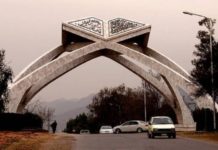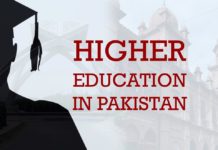Disclaimer: The Eqbal Ahmad Centre for Public Education (EACPE) encourages critical and independent thinking and believes in a free expression of one’s opinion. However, the views expressed in contributed articles are solely those of their respective authors and do not necessarily reflect the position or policy of the EACPE.
It’s “Major Day”, a two to three hour seminar for freshmen arranged to give an introduction to all of the six majors offered at one of Pakistan’s finest Science and Engineering Schools: the Syed Babar Ali School of Science and Engineering at LUMS, called “SSE” for short. The best and brightest young minds of the country occupy the spacious auditorium on the third floor of SSE’s formidable building, imaginatively called “SSE 301”. The deemed best and brightest subset of the best and brightest occupies the front rows of the auditorium. What, one might wonder, is this collection of geniuses, the scientific future of South Asia discussing? Perhaps contemplating the vast and exciting fields of study, they have the opportunity to pursue? Or maybe expressing their passion for their intended major? Or even discussing some interesting problems they’ve looked up and might want to take on as summer research projects? No. They’re discussing jobs and salaries.
Intelligence, however, in spite of popular belief, is not a requirement for being a scientist. There is just one requirement for being a true scientist, and sadly as highlighted above, most young minds in this country seem to lack it: curiosity.
There seems to be a vibrant discussion going on among some of the future Computer Scientists, the would-be Alan Turings, SteveWozniak and Bill Gates of tomorrow. It is not about mind-blowing problems in Computational Complexity Theory. Nor is it about how innovative apps and programs can be developed to make life more comfortable. It’s related to the terminology of the programme. According to them, the programme should have been called “Software Engineering” instead of Computer Science as that term is better received by employers. They’re excited about their education, but sadly, for all the wrong reasons. To put it bluntly, the goal seems to be to get a well-paying job, not to do Science. A couple of weeks before this event, I met Dr. Pervez Hoodbhoy in his office at the Forman Christian College and we had a discussion on the state of science in Pakistan. He said something then that came back to me at this event and I realized that, sadly, it was all too true: “Is mulk ki dukandaron wali soch hai.”
It is a momentous time in the history of Pakistan and a lot of other highly-populated developing countries in Asia. It is a time when agricultural economies are being trumped and superceded by what are called “Knowledge Economies”. I feel that now, more than ever, Pakistan needs a Carl Sagan (or millions of them). It was Carl Sagan that taught me and innumerable others that Science was a “way of thinking, much more than a body of knowledge”. Pakistan is blessed with countless young and intelligent people. Intelligence, however, in spite of popular belief, is not a requirement for being a scientist. There is just one requirement for being a true scientist, and sadly as highlighted above, most young minds in this country seem to lack it: curiosity. The ability to inquire objectively and make adapt and change one’s world view based on evidence and observation alone. The ability to let go of previously indoctrinated dogmas. Curiosity does quite a lot more than kill the cat. It also helps us create Quantum Computers. It allows us to create networks that span the planet, leaving no person alone or uninformed. It enables us to land on the Moon and send rovers to Mars (ever wondered why the most recent one sent by NASA is called “Curiosity”?). “Humans, like the gods of old, living in the sky” as Carl Sagan eloquently put it. Whether, we as a country want to remain in chronic debt and the dark ages, or make some of the most mythic human achievements and maybe someday depart on interstellar voyages of discovery depends on our young minds developing this quality. Per aspera ad astra.
Contributed by Muhammad Ahmad Tirmazi







